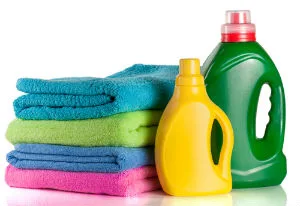Fabric softener Finder: Should you be using fabric softener?
Find out if fabric softener is worth adding to your laundry routine.
We’re reader-supported and may be paid when you visit links to partner sites. We don’t compare all products in the market, but we’re working on it!


Best Rated Fabric Softeners Brand: ALDI
If you want a fabric softener that delivers, then Aussies recommend ALDI. Best rated for softness of clothes and value for money, it's the clear winner in this category.
Key facts about fabric softener:
- You can add a fabric softener to your washing machine during the laundry cycle to help make your clothes feel softer.
- While fabric softeners are relatively low cost at around $0.40 - $10 per litre, many people find using fabric softener to be unnecessary.
- Fabric softeners can cause a build-up of residue in your washing machine, make certain clothing less fire resistant, damage fabrics and irritate skin. For many people, the risks of using a fabric softener far outweigh the costs.
What is fabric softener?
Fabric softener is a conditioner used to soften the fabric and decrease friction when washing clothes. By applying a thin, waxy coating to your laundry, it helps to keep clothes in their original shape and limits colour fading. It also helps reduce fuzz and pilling.
Generally, fabric softeners are made of oil or silicon-based compounds that coat the fabric, making it feel softer. Some brands may use animal fat by-products.
While fabric softener softens clothes, laundry detergent does the heavy duty work, helping to clean clothes of dirt, sweat, food particles, hair and more.
Why should I consider (or ditch) fabric softener?
Pros
- Softens clothes. The main benefit to using fabric softener is that it makes your clothing feel soft to the touch.
- Reduces static. Fabric softener can help reduce static electricity in your clothing.
- Fragrance. Most fabric softeners include perfumed scents. However, if you are sensitive to perfume, fragrance-free formulas are also available.
- Reduces fabric stiffness. If you dry your clothes on a clothesline and find that some items feel stiff when they dry, fabric softener could help.
- Easier ironing. Fabric softener can help straighten out the fibres in clothing and make them easier to iron, or in some cases eliminate the need for ironing entirely.
Cons
- Less fire-resistance. Fabric softener can make fabrics less flame retardant. Most manufacturers do not recommend using fabric softener on children's sleepwear.
- Residue build-up. Fabric softeners can contribute to residue deposits. This residue can trap moisture in elastane and nylon clothing and slowly clog up the inside of your washing machine. To minimise residue when using fabric softener, ensure you run an occasional hot water cycle.
- Skin irritants. Perfumes used may irritate skin, especially for kids and those with eczema or asthma.
- Fabric damage. Fabric softener can damage certain fabric types, including synthetic, sweat-resistant clothing found in sports gear, linen, silk and bamboo.
- May contain animal products. Some brands of fabric softener use animal fat and are not vegan-friendly.
- Environmental risks. Many fabric softeners contain non-renewable petroleum-based chemicals that are not easily biodegradable and can be toxic to marine life.
If the cons of using fabric softener outweigh the positives for you, read on to find out what alternatives you could try instead.
Which fabric softener is best for me?

If you decide to use fabric softener, look for brands with a good water absorbency score or else your towels might not be as effective.
If you or anyone in your household has sensitive skin, look for brands that are hypoallergenic or low-irritant to avoid irritating eczema, rashes or allergies.
If you have children, ensure that you don't use fabric softener on your kids' sleepwear to avoid reducing its fire resistance. You don't want to lose sleep worrying about flammable sleepwear. Check the labels of fabric softeners and you will probably find a warning not to use them with children's sleepwear. If possible, look for one that doesn't reduce clothes' fire-resistance.
Fabric softener alternatives
For those who would rather go without fabric softener, here are several low-cost alternatives you could try instead:
Distilled white vinegar
Pros:
- Eco-friendly and affordable
- Helps neutralise odours and whiten clothing
- Cleans away dirt and other deposits in your washing machine
How to use it: Add half a cup or one cup during the rinse cycle. For a pleasant scent, you can add essential oils to the vinegar.
Note: Do not mix vinegar with bleach, ammonia products or other household chemicals. Also, you shouldn't use vinegar certain fabrics such as silk and acetate.
Baking soda (sodium bicarbonate)
Pros:
- Helps to soften your clothing
- Eco-friendly and affordable
- Deodorizes clothing
How to use it: If you use liquid detergent, add a quarter to half cup of baking soda when you load your clothing into the washer. If you use powder, add the baking soda while the washing machine is rinsing your clothing.
Dryer sheets
Pros:
- Softens fabric
- Decreases static cling
- Adds a pleasant fragrance to clothing
Cons:
- Residue can build up on the lint filter and stick to your clothes
How to use it: Add dryer sheets to the dryer with your wet laundry.
Dryer balls
Pros:
- Inexpensive
- Reusable and eco-friendly
- Lifts and separates your laundry, helping air in the dryer to flow more efficiently
How to use it: Add dryer balls directly into the dryer
Tips to reduce clothing stiffness and save money on laundry
- Use less laundry detergent. If your laundry is coming out stiff and scratchy, you may be using too much laundry detergent. You may only need to use as little as a quarter cup for a load. Excess detergent can also cause skin irritation, build up and damage your machine and waste water as your machine needs to perform several rinse cycles to get rid of the suds.
- Use lower spin speeds. Generally, many front-loading machines offer very powerful spin speeds greater than 1000 rpm. Forcefully wringing water from your clothing could make them stiffer. When drying towels, spin them at 600-800 rpm to make them softer and fluffier.
- Line dry. You can line dry your laundry to avoid static getting onto your clothing. If you live in an apartment and don't have space to hang your clothes, check out our laundry hacks for small spaces to get some ideas or find out how much it costs to renovate your laundry space.
Best rated fabric softener brand award breakdown
| Total Score | Overall rating | Value for Money | Packaging | Scent | Softness of clothes | |
|---|---|---|---|---|---|---|
| Other | 8.26 | 4.50 | 4.30 | 4.40 | 4.40 | 4.45 |
| ALDI | 8.25 | 4.48 | 4.74 | 4.28 | 4.22 | 4.46 |
| Earth Choice | 8.06 | 4.36 | 4.52 | 4.34 | 4.30 | 4.34 |
| Huggies | 8.05 | 4.43 | 4.12 | 4.36 | 4.29 | 4.21 |
| Comfort | 7.96 | 4.30 | 4.10 | 4.28 | 4.30 | 4.30 |
| Fluffy | 7.88 | 4.28 | 4.06 | 4.28 | 4.26 | 4.28 |
| Coles | 7.74 | 4.22 | 4.22 | 4.06 | 4.06 | 4.08 |
| Woolworths | 7.71 | 4.23 | 4.20 | 4.09 | 4.27 | 3.91 |
| Cuddly | 7.70 | 4.20 | 3.88 | 4.02 | 4.18 | 4.16 |

More guides on Finder
-
Best front-loader washing machines in Australia
We’ve read hundreds of customer reviews to find the best front-loader washing machines for every budget.
-
Best washer dryer combos in Australia
These are the six best washer dryer combos you can purchase in Australia right now.
-
Brands that cleaned up in the 2020/2021 Finder Retail Awards
Australia’s top-rated cleaning brands have been revealed across a range of categories in Finder’s 2020/2021 Retail Awards.
-
Washing your face mask: What you need to know
How often should you wash it? Does the same apply for all types? Your questions answered.
-
Coronavirus car care tips
Been washing your hands and cleaning your devices but forgot your car? Here's how to give your car a deep clean.
-
Best laundry detergents in Australia
From the best liquid to the top product for front loaders, we’ve found the ten best laundry detergents available in Australia right now.
-
First apartment checklist: Make moving day stress free
Worried you’re forgetting something? Use our handy checklist to make sure you’ve got all your new home essentials sorted.
-
Creative and space-saving storage ideas you need to know
Do you need to maximise the space you have? Find out how you can get the most out of your home with these creative storage ideas.
-
Laundry ball buying guide: How to find the best laundry ball
Learn if a laundry ball could help make your laundry routine easier.
-
Best clothes dryers in Australia 2021
We’ve read thousands of customer and expert reviews to find the 11 best clothes dryers for all your laundry needs.
Ask an Expert